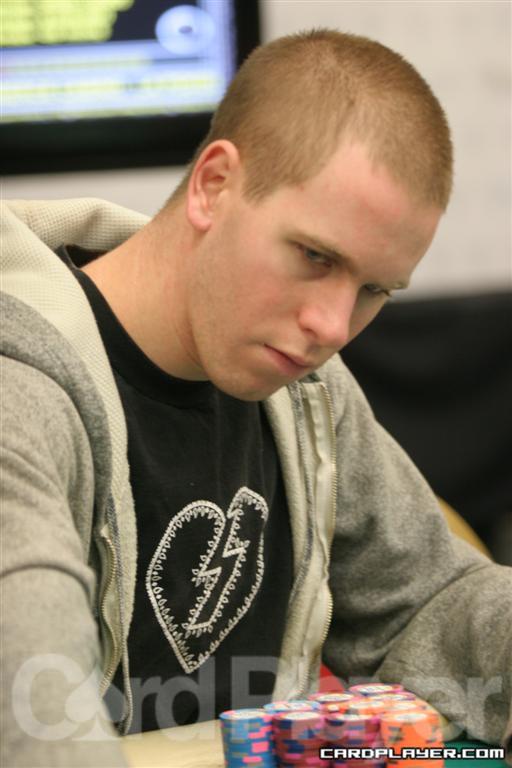Winner's Circle -- Jeff MadsenMadsen Talks About His Preliminary Tournament Win at the L.A. Poker Classic |
|
|

This week’s winner is Jeff Madsen, who won a $1,500 no-limit hold’em preliminary event at the L.A. Poker Classic. He also made the final table of the $10,000 H.O.R.S.E. event at the LAPC. Madsen has been on a tear to start 2009, also making preliminary event final tables at the Aussie Millions, Wynn Classic, and World Poker Challenge.
Card Player caught up with Madsen at Commerce Casino and he talked about his 2009 tournament win and using hot streaks to your advantage as a poker player.
Ryan Lucchesi: Was this tournament one of those events where you came from behind to win, or did you just cruise with the chip lead for most of the way?
Jeff Madsen: That tournament I really did have the chip lead for the second half of the tournament, it felt like. I really just picked up a lot of hands. There was one point where four hands in a row I four-bet preflop and I had good hands every time. The tournament didn’t feel too tough, because I was getting good situations. At the final table, maybe I lost the chip lead for a little bit. I never really got short or anything, I was never in danger, I was never all in for my tournament life. I got kings three-handed and took out the guy in second, and then heads up I got tens and won with that hand. It was a fun tournament.
RL: Was the hand with kings the most important or the tens?
JM: Probably the kings, because with three of us left, there was one good player and the other guy was an older guy who wasn’t a great player, so I’d rather get heads up with him. I picked up kings against the other guy, Tyler, and he had a lot of chips, so that gave me a good chip lead heads up. After that, I was just grinding him down.
RL: So you never really felt like the tournament was out of your control in the final stages?
JM: No. Especially heads up…I’m good at heads up because I’m an aggressive player and I think I can read people pretty well. I had to pick up some hands, obviously, but it kind of just worked out.
RL: How does your approach to a $1,500 preliminary event differ from your approach to a $10,000 championship event?
JM: With deeper-stack tournaments, you approach them a little differently in the beginning. You can gamble a little bit because you have chips, but it’s an important tournament, so you can’t mess around. Maybe in a $1,500 I might try and gamble kind of early and try to double up early so I have some chips to push people around, but sometimes I do that in big tournaments, too. It’s just a different dynamic, people are playing their A-game, and it’s just an important tournament, and it’s a five-day tournament, so you’re not trying to win it on the first day. It’s a long haul, in general; just don’t do anything stupid. I approach most tournaments similarly, but the $10K events are unique in their own way.
RL: You’re a player that has booked one of the most impressive hot streaks in the history of the game at the 2006 World Series of Poker, and you have rattled off a collection of cashes early in 2009. Do you feel that poker players can go on hot streaks?
JM: It’s all about streaks. I started my career streaky just because of my style, and I’m young, and it’s all about your mindset. It’s not just about the cards, it seems like when you’re on a hot streak, you’re getting good cards. The reality is nobody runs that good or that bad, it’s really just about when you’re in a good mindset, then you’re going to be playing better, and it seems like you’re winning more hands, but really you’re just playing better and you’re attracting good things towards you. I believe in all of that law of attraction stuff.
RL: So you would say that confidence breeds success?
JM: If you’re down, then there’s no way you’re going to win, because even if you get good hands, you’re not going to play them well, and people can read you better when you’re in a different mental state.
RL: You made the H.O.R.S.E. final table at the LAPC with a couple other young H.O.R.S.E. players. Do you feel like there is a group of young players who have embraced H.O.R.S.E.?
JM: Yeah, definitely. I think when poker first started getting big, it was more about no-limit, obviously, because everyone was learning that, but now kids are just learning all of the games and having their own take on it. So, I think the older guys who have played stud for so long are seeing kids play hands differently, maybe more aggressively. So, it’s a new face for H.O.R.S.E. There’s definitely going to be a lot of young guys who will be doing well in the future.
RL: Do you think the old-school players will have to adjust to the different playing style of young players in H.O.R.S.E. tournaments the same way they did for no-limit hold’em?
JM: We’re adjusting to H.O.R.S.E. now, and I think when you start playing at 19, by the time you’re 25 you’re going to be really good at H.O.R.S.E. and it’s going to be unexpected. Also, the perception when an older guy sees a young kid playing H.O.R.S.E., they might give him less respect or not think he’s as good a player, so that might work to their advantage, too.
